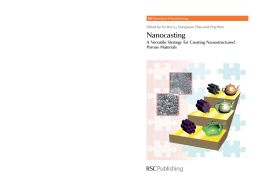
Additional Information
Book Details
Abstract
Nanostructured materials with tailored properties are regarded as a fundamental element in the development of future science and technology. Research is still ongoing into the nanosized construction elements required to create functional solids. The recently developed technique, nanocasting, has great advantage over others in terms of the synthesis of special nanostructured materials by the careful choice of suitable elements and nanoengineering steps. This new book summarizes the recent developments in nanocasting, including the principles of nanocasting, syntheses of novel nanostructured materials, characterization methods, detailed synthetic recipes and further possible development in this area. The book focuses on the synthesis of porous solids from the viewpoint of methodology and introduces the science of nanocasting from fundamental principles to their use in synthesis of various materials. It starts by outlining the principles of nanocasting, requirements to the templates and precursors and the tools needed to probe matter at the nanoscale level. It describes how to synthesize nano structured porous solids with defined characteristics and finally discusses the functionalization and application of porous solids. Special attention is given to new developments in this field and future perspectives. A useful appendix covering the detailed synthetic recipes of various templates including porous silica, porous carbon and colloidal spheres is included which will be invaluable to researchers wanting to follow and reproduce nanocast materials. Topics covered in the book include: * inorganic chemistry * organic chemistry * solution chemistry * sol-gel and interface science * acid-base equilibria * electrochemistry * biochemistry * confined synthesis The book gives readers not only an overview of nanocasting technology, but also sufficient information and knowledge for those wanting to prepare various nanostructured materials without needing to search the available literature.
An-Hui Lu,currently at the Max-Planck-Institut f³r Kohlenforschung, originally received his BS from Taiyuan University of Technology. He obtained his PhD in 2001 from the Institute of Coal Chemistry at the Chinese Academy of Sciences. After post-doctoral experience as a Max-Planck research fellow and Alexander von Humboldt fellow at the Max-Planck-Institut f³r Kohlenforschung, he was promoted to group leader in 2005. He received the Brian Kelly Award in 2006 and in 2007 he became guest professor at the Dalian University of Technology. His research interests include synthesis and functionalization of nanostructured materials and magnetically separable catalysts and the use of these materials in heterogeneous catalytic reactions. Dongyuan Zhao, currently at the Department of Chemistry, Fudan University received his BS and MS in chemistry from Jilin University. He obtained his PhD in 1990 from Jilin University and the Dalian Institute of Chemical Physics. In 1992-1993, he was a visiting scholar at the Department of Chemistry, University of Regina and later carried out his postdoctoral research at the Weizmann Institute of Science followed by the University of Houston and the University of California at Santa Barbara. He is now a Professor (Cheung Kong Professorship) in the Department of Chemistry at Fudan University and in 2007 he was elected as academician of the Chinese Academy of Sciences. His current research interests include synthesis, structural characterization and application on ordered porous materials, such as mesoporous materials, zeolites and coordination polymers.
